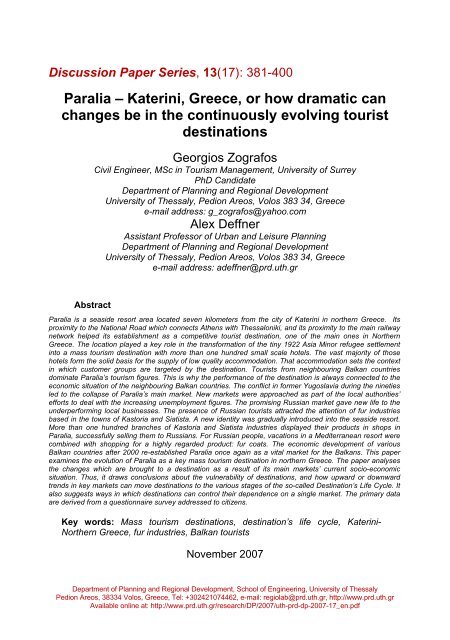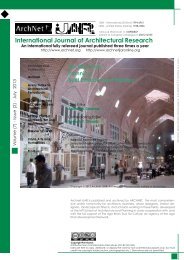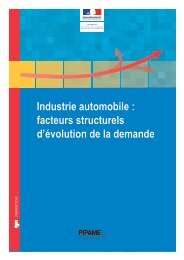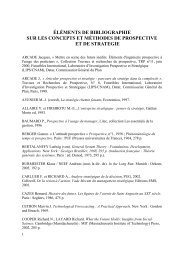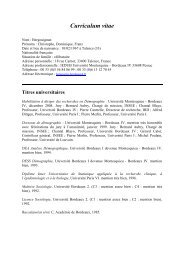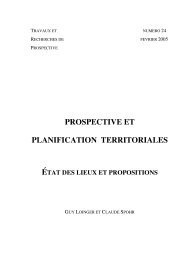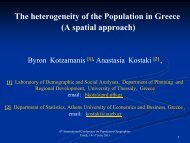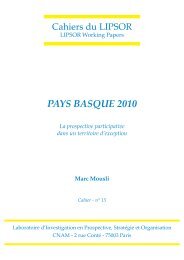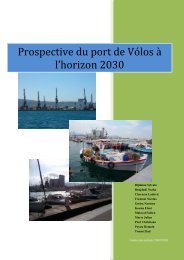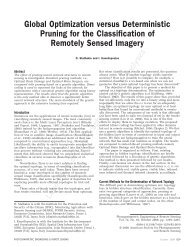Paralia – Katerini, Greece, or how dramatic can changes be in the ...
Paralia – Katerini, Greece, or how dramatic can changes be in the ...
Paralia – Katerini, Greece, or how dramatic can changes be in the ...
Create successful ePaper yourself
Turn your PDF publications into a flip-book with our unique Google optimized e-Paper software.
Discussion Paper Series, 13(17): 381-400<br />
<strong>Paralia</strong> <strong>–</strong> <strong>Kater<strong>in</strong>i</strong>, <strong>Greece</strong>, <strong>or</strong> <strong>how</strong> <strong>dramatic</strong> <strong>can</strong><br />
<strong>changes</strong> <strong>be</strong> <strong>in</strong> <strong>the</strong> cont<strong>in</strong>uously evolv<strong>in</strong>g tourist<br />
dest<strong>in</strong>ations<br />
Ge<strong>or</strong>gios Zografos<br />
Civil Eng<strong>in</strong>eer, MSc <strong>in</strong> Tourism Management, University of Surrey<br />
PhD Candidate<br />
Department of Plann<strong>in</strong>g and Regional Development<br />
University of Thessaly, Pedion Areos, Volos 383 34, <strong>Greece</strong><br />
e-mail address: g_zografos@yahoo.com<br />
Alex Deffner<br />
Assistant Profess<strong>or</strong> of Urban and Leisure Plann<strong>in</strong>g<br />
Department of Plann<strong>in</strong>g and Regional Development<br />
University of Thessaly, Pedion Areos, Volos 383 34, <strong>Greece</strong><br />
e-mail address: adeffner@prd.uth.gr<br />
Abstract<br />
<strong>Paralia</strong> is a seaside res<strong>or</strong>t area located seven kilometers from <strong>the</strong> city of <strong>Kater<strong>in</strong>i</strong> <strong>in</strong> n<strong>or</strong><strong>the</strong>rn <strong>Greece</strong>. Its<br />
proximity to <strong>the</strong> National Road which connects A<strong>the</strong>ns with Thessaloniki, and its proximity to <strong>the</strong> ma<strong>in</strong> railway<br />
netw<strong>or</strong>k helped its establishment as a competitive tourist dest<strong>in</strong>ation, one of <strong>the</strong> ma<strong>in</strong> ones <strong>in</strong> N<strong>or</strong><strong>the</strong>rn<br />
<strong>Greece</strong>. The location played a key role <strong>in</strong> <strong>the</strong> transf<strong>or</strong>mation of <strong>the</strong> t<strong>in</strong>y 1922 Asia M<strong>in</strong><strong>or</strong> refugee settlement<br />
<strong>in</strong>to a mass tourism dest<strong>in</strong>ation with m<strong>or</strong>e than one hundred small scale hotels. The vast maj<strong>or</strong>ity of those<br />
hotels f<strong>or</strong>m <strong>the</strong> solid basis f<strong>or</strong> <strong>the</strong> supply of low quality accommodation. That accommodation sets <strong>the</strong> context<br />
<strong>in</strong> which customer groups are targeted by <strong>the</strong> dest<strong>in</strong>ation. Tourists from neighbour<strong>in</strong>g Balkan countries<br />
dom<strong>in</strong>ate <strong>Paralia</strong>’s tourism figures. This is why <strong>the</strong> perf<strong>or</strong>mance of <strong>the</strong> dest<strong>in</strong>ation is always connected to <strong>the</strong><br />
economic situation of <strong>the</strong> neighbour<strong>in</strong>g Balkan countries. The conflict <strong>in</strong> f<strong>or</strong>mer Yugoslavia dur<strong>in</strong>g <strong>the</strong> n<strong>in</strong>eties<br />
led to <strong>the</strong> collapse of <strong>Paralia</strong>’s ma<strong>in</strong> market. New markets were approached as part of <strong>the</strong> local auth<strong>or</strong>ities’<br />
eff<strong>or</strong>ts to deal with <strong>the</strong> <strong>in</strong>creas<strong>in</strong>g unemployment figures. The promis<strong>in</strong>g Russian market gave new life to <strong>the</strong><br />
underperf<strong>or</strong>m<strong>in</strong>g local bus<strong>in</strong>esses. The presence of Russian tourists attracted <strong>the</strong> attention of fur <strong>in</strong>dustries<br />
based <strong>in</strong> <strong>the</strong> towns of Kast<strong>or</strong>ia and Siatista. A new identity was gradually <strong>in</strong>troduced <strong>in</strong>to <strong>the</strong> seaside res<strong>or</strong>t.<br />
M<strong>or</strong>e than one hundred branches of Kast<strong>or</strong>ia and Siatista <strong>in</strong>dustries displayed <strong>the</strong>ir products <strong>in</strong> shops <strong>in</strong><br />
<strong>Paralia</strong>, successfully sell<strong>in</strong>g <strong>the</strong>m to Russians. F<strong>or</strong> Russian people, vacations <strong>in</strong> a Mediterranean res<strong>or</strong>t were<br />
comb<strong>in</strong>ed with shopp<strong>in</strong>g f<strong>or</strong> a highly regarded product: fur coats. The economic development of various<br />
Balkan countries after 2000 re-established <strong>Paralia</strong> once aga<strong>in</strong> as a vital market f<strong>or</strong> <strong>the</strong> Balkans. This paper<br />
exam<strong>in</strong>es <strong>the</strong> evolution of <strong>Paralia</strong> as a key mass tourism dest<strong>in</strong>ation <strong>in</strong> n<strong>or</strong><strong>the</strong>rn <strong>Greece</strong>. The paper analyses<br />
<strong>the</strong> <strong>changes</strong> which are brought to a dest<strong>in</strong>ation as a result of its ma<strong>in</strong> markets’ current socio-economic<br />
situation. Thus, it draws conclusions about <strong>the</strong> vulnerability of dest<strong>in</strong>ations, and <strong>how</strong> upward <strong>or</strong> downward<br />
trends <strong>in</strong> key markets <strong>can</strong> move dest<strong>in</strong>ations to <strong>the</strong> various stages of <strong>the</strong> so-called Dest<strong>in</strong>ation’s Life Cycle. It<br />
also suggests ways <strong>in</strong> which dest<strong>in</strong>ations <strong>can</strong> control <strong>the</strong>ir dependence on a s<strong>in</strong>gle market. The primary data<br />
are derived from a questionnaire survey addressed to citizens.<br />
Key w<strong>or</strong>ds: Mass tourism dest<strong>in</strong>ations, dest<strong>in</strong>ation’s life cycle, <strong>Kater<strong>in</strong>i</strong>-<br />
N<strong>or</strong><strong>the</strong>rn <strong>Greece</strong>, fur <strong>in</strong>dustries, Balkan tourists<br />
Novem<strong>be</strong>r 2007<br />
Department of Plann<strong>in</strong>g and Regional Development, School of Eng<strong>in</strong>eer<strong>in</strong>g, University of Thessaly<br />
Pedion Areos, 38334 Volos, <strong>Greece</strong>, Tel: +302421074462, e-mail: regiolab@prd.uth.gr, http://www.prd.uth.gr<br />
Available onl<strong>in</strong>e at: http://www.prd.uth.gr/research/DP/2007/uth-prd-dp-2007-17_en.pdf
How <strong>dramatic</strong> <strong>can</strong> <strong>changes</strong> <strong>be</strong> <strong>in</strong> <strong>the</strong> cont<strong>in</strong>uously evolv<strong>in</strong>g tourist dest<strong>in</strong>ations 383<br />
Introduction<br />
<strong>Greece</strong>’s position on <strong>the</strong> edge of <strong>the</strong> Balkan Pen<strong>in</strong>sula ensures that, due to <strong>the</strong>ir<br />
proximity, Balkan countries <strong>can</strong> constitute <strong>Greece</strong>’s ma<strong>in</strong> tourism markets. Accessibility<br />
is a determ<strong>in</strong><strong>in</strong>g fact<strong>or</strong> regard<strong>in</strong>g <strong>the</strong> potential perf<strong>or</strong>mance of a dest<strong>in</strong>ation, whatever<br />
<strong>the</strong> spatial entity may <strong>be</strong>. F<strong>or</strong> example, amongst o<strong>the</strong>r fact<strong>or</strong>s, <strong>the</strong> fact that France is so<br />
close <strong>in</strong> maj<strong>or</strong> European outbound markets determ<strong>in</strong>es its prom<strong>in</strong>ent position as a<br />
tourist dest<strong>in</strong>ation.<br />
In <strong>the</strong> context of n<strong>or</strong><strong>the</strong>rn <strong>Greece</strong>, tourism development is ma<strong>in</strong>ly concentrated <strong>in</strong> <strong>the</strong><br />
coastal areas of central Macedonia. The un<strong>or</strong>ganised character of <strong>the</strong> region’s tourism<br />
development is ma<strong>in</strong>ly due to <strong>the</strong> fact that it was based on small tour operat<strong>or</strong>s and<br />
s<strong>in</strong>gle travellers. <strong>Paralia</strong> is located near to Mount Olympus and it is one of <strong>the</strong> top<br />
dest<strong>in</strong>ations of n<strong>or</strong><strong>the</strong>rn <strong>Greece</strong>. On a summer's day, <strong>the</strong> dest<strong>in</strong>ation hosts m<strong>or</strong>e than<br />
fifty thousands tourists. The tourists’ profile is 20 to 30 years old and low-to medium<strong>in</strong>come<br />
bracket. Tourism demand f<strong>or</strong> <strong>Paralia</strong> is generated ma<strong>in</strong>ly <strong>in</strong> <strong>the</strong> nearby Balkan<br />
countries such as Romania, Bulgaria, FYROM, and Serbia. The total mix is enriched<br />
with Hungarians, Czechs, Russians, Polish, Germans and Austrians.<br />
<strong>Paralia</strong> is very close <strong>in</strong> <strong>Kater<strong>in</strong>i</strong>, one of <strong>the</strong> biggest cities <strong>in</strong> n<strong>or</strong><strong>the</strong>rn <strong>Greece</strong> and one of<br />
<strong>the</strong> most dynamic due to <strong>the</strong> fact that it houses a concentration of all those fact<strong>or</strong>s<br />
mentioned by Gospod<strong>in</strong>i, which would enable its fur<strong>the</strong>r development (2005, p.145).<br />
<strong>Kater<strong>in</strong>i</strong> is close to Thessaloniki (69 kilometres), it is very close to tourist dest<strong>in</strong>ations<br />
such as <strong>Paralia</strong> and it is aligned with <strong>the</strong> ma<strong>in</strong> transp<strong>or</strong>tation systems of <strong>Greece</strong>.<br />
Actually, <strong>Kater<strong>in</strong>i</strong> and <strong>Paralia</strong> have complimentary functions and act as a dipole. It is<br />
quite extra<strong>or</strong>d<strong>in</strong>ary that <strong>the</strong> populations of <strong>Paralia</strong> and <strong>Kater<strong>in</strong>i</strong> tend to <strong>be</strong> equal dur<strong>in</strong>g<br />
<strong>the</strong> high season <strong>in</strong> summer, while throughout <strong>the</strong> rest of <strong>the</strong> year <strong>the</strong> difference is<br />
tremendous. That k<strong>in</strong>d of relationship is quite peculiar to <strong>the</strong> Greek spatial system.<br />
Tourist development <strong>in</strong> <strong>the</strong> area of <strong>Paralia</strong> obviously <strong>be</strong>nefits <strong>the</strong> city of <strong>Kater<strong>in</strong>i</strong>, which<br />
is <strong>the</strong> commercial centre of <strong>the</strong> wider area <strong>–</strong> this follows <strong>the</strong> general observation made<br />
by Cooper et al (1993/1998).<br />
<strong>Paralia</strong> <strong>can</strong> <strong>be</strong> characterised as “trapped”. Intensive hotel and apartment block<br />
development dur<strong>in</strong>g previous years has caused several problems. Urbanisation seems<br />
to <strong>be</strong> <strong>the</strong> key issue. Erosion of <strong>be</strong>aches is ano<strong>the</strong>r maj<strong>or</strong> issue as well, and <strong>the</strong> latter<br />
plays an imp<strong>or</strong>tant role <strong>in</strong> local politics due to <strong>the</strong> signifi<strong>can</strong>ce of <strong>be</strong>aches as <strong>be</strong><strong>in</strong>g <strong>the</strong><br />
one and only tourist resource. As it is po<strong>in</strong>ted out by many <strong>in</strong>habitants of <strong>the</strong> area,<br />
<strong>Paralia</strong> is trapped <strong>in</strong> target<strong>in</strong>g specific groups of <strong>the</strong> global tourist demand due to <strong>the</strong> low<br />
quality supply it has to offer. The possibility of <strong>the</strong> place <strong>be</strong><strong>in</strong>g upgraded <strong>in</strong> <strong>or</strong>der to<br />
attract higher <strong>in</strong>come tourists is small, due to <strong>the</strong> fact that <strong>the</strong>re are no signifi<strong>can</strong>t capital<br />
<strong>in</strong>vestments by maj<strong>or</strong> tour operat<strong>or</strong>s as happens <strong>in</strong> o<strong>the</strong>r parts of <strong>the</strong> Mediterranean,<br />
such as Maj<strong>or</strong>ca, Crete etc.<br />
Discussion Paper Series, 2007, 13(17)
384 Ge<strong>or</strong>gios Zografos, Alex Deffrer<br />
A survey based on questionnaires was <strong>or</strong>ganised <strong>in</strong> <strong>or</strong>der to acquire <strong>the</strong> citizens’ po<strong>in</strong>t<br />
of view concern<strong>in</strong>g <strong>the</strong> situation <strong>in</strong> <strong>Paralia</strong>. Proposals are made <strong>in</strong> <strong>or</strong>der to provide<br />
solutions to several issues which constitute <strong>the</strong> “trap” <strong>the</strong> dest<strong>in</strong>ation is <strong>in</strong>.<br />
1. Tourism Development <strong>in</strong> <strong>Greece</strong><br />
In <strong>the</strong> context of global tourism, it <strong>can</strong> <strong>be</strong> said that <strong>the</strong> future seems very promis<strong>in</strong>g.<br />
Several reasons are relevant here - first of all, <strong>the</strong> fact that <strong>the</strong> disposable <strong>in</strong>come will <strong>be</strong><br />
<strong>in</strong>creased. Tourist activities will <strong>be</strong> promoted through <strong>the</strong> <strong>in</strong>flux of capital. Tourist<br />
development will <strong>be</strong> <strong>the</strong> key to economic development f<strong>or</strong> various regions throughout<br />
<strong>the</strong> w<strong>or</strong>ld.<br />
As far as <strong>Greece</strong> is concerned, its perf<strong>or</strong>mance as a tourist dest<strong>in</strong>ation is shaped by <strong>the</strong><br />
general conditions <strong>in</strong> <strong>the</strong> Mediterranean. Tourism has proved to <strong>be</strong> <strong>the</strong> most powerful<br />
and reliable fact<strong>or</strong> f<strong>or</strong> regional development <strong>in</strong> <strong>Greece</strong>.<br />
As is <strong>be</strong> po<strong>in</strong>ted by Lagos (2003, p. 325), <strong>in</strong> many areas, tourism has helped to reverse<br />
negative demographic data. <strong>Greece</strong> has a pleth<strong>or</strong>a of cultural and natural assets, a fact<br />
that could only promote its position among <strong>the</strong> most popular tourist dest<strong>in</strong>ations globally.<br />
The tourist <strong>in</strong>frastructure of <strong>the</strong> country <strong>in</strong>cludes ski<strong>in</strong>g centres, mounta<strong>in</strong> res<strong>or</strong>ts, spa<br />
centres, water <strong>the</strong>rapy centres, mar<strong>in</strong>es, museums and archaeological sites.<br />
The k<strong>in</strong>d of tourism that <strong>Greece</strong> has developed through <strong>the</strong> last decades has <strong>be</strong>en<br />
based on a clear image of <strong>the</strong> sea, sun, sand and sex (4S). <strong>Greece</strong>, <strong>how</strong>ever, has not<br />
solved many of its problems <strong>in</strong> <strong>the</strong> context of tourist development. Those problems<br />
seem to now have started hav<strong>in</strong>g an <strong>in</strong>fluence on <strong>the</strong> perf<strong>or</strong>mance of <strong>the</strong> Greek tourist<br />
<strong>in</strong>dustry. As is clarified by Lagos (2003, p. 326 ), <strong>the</strong> most imp<strong>or</strong>tant problems are <strong>the</strong><br />
ones mentioned <strong>be</strong>low.<br />
The Greek tourist product is not differentiated from that of o<strong>the</strong>r Mediterranean<br />
countries. Its competitiveness f<strong>or</strong> a long period of time was based solely on <strong>the</strong><br />
reduction of prices.<br />
• The sole dependence of <strong>the</strong> Greek tourist <strong>in</strong>dustry on a specific model of tourist<br />
development has led to <strong>the</strong> total dom<strong>in</strong>ance of <strong>the</strong> tour operat<strong>or</strong>s, who determ<strong>in</strong>e<br />
almost anyth<strong>in</strong>g that has to do with <strong>the</strong> context of tourist development <strong>in</strong> <strong>Greece</strong>.<br />
Acc<strong>or</strong>d<strong>in</strong>g to Lagos (2003, p. 327), <strong>the</strong> fact that hotels regularly operate with<br />
occupancy levels of 60%, is partly due to <strong>the</strong> fact mentioned above. Fur<strong>the</strong>rm<strong>or</strong>e,<br />
<strong>the</strong> <strong>in</strong>crease <strong>in</strong> <strong>be</strong>ds which comes with <strong>the</strong> creation of new res<strong>or</strong>ts has not <strong>be</strong>en<br />
abs<strong>or</strong><strong>be</strong>d by <strong>the</strong> parallel <strong>in</strong>crease of demand.<br />
UNIVERSITY OF THESSALY, Department of Plann<strong>in</strong>g and Regional Development
How <strong>dramatic</strong> <strong>can</strong> <strong>changes</strong> <strong>be</strong> <strong>in</strong> <strong>the</strong> cont<strong>in</strong>uously evolv<strong>in</strong>g tourist dest<strong>in</strong>ations 385<br />
• Seasonality is a structural problem of Greek tourism. The mass tourism model is<br />
focused only <strong>in</strong> <strong>the</strong> summer period. That is why <strong>Greece</strong> has one of <strong>the</strong> sh<strong>or</strong>test<br />
tourist seasons among <strong>the</strong> dest<strong>in</strong>ations of <strong>the</strong> Mediterranean.<br />
• The fact is that tourist development is exquisitely concentrated <strong>in</strong> specific spots.<br />
Even <strong>in</strong> <strong>the</strong> context of <strong>the</strong> same municipality, <strong>the</strong>re are areas which are excessively<br />
developed and o<strong>the</strong>rs which are not.<br />
Some structural problems of <strong>the</strong> Greek state have also resulted <strong>in</strong> <strong>the</strong> absence of<br />
efficient mechanisms (land-plann<strong>in</strong>g design<strong>in</strong>g, peripheral design<strong>in</strong>g, personnel<br />
specialisation) which would ensure appropriate tourist development. The model of<br />
tourist development <strong>in</strong> <strong>Greece</strong> is ma<strong>in</strong>ly <strong>the</strong> same throughout <strong>the</strong> country. Various<br />
fact<strong>or</strong>s, <strong>how</strong>ever, have led to a slightly different model of development <strong>in</strong> each region.<br />
We <strong>can</strong> say that all regions of <strong>the</strong> country <strong>can</strong> <strong>be</strong> categ<strong>or</strong>ised based on <strong>how</strong> developed<br />
<strong>the</strong>y are <strong>in</strong> tourist terms. It <strong>can</strong> <strong>be</strong> said that <strong>the</strong> follow<strong>in</strong>g regions are <strong>the</strong> ones where<br />
tourism is well developed;<br />
• Sou<strong>the</strong>rn Aegean<br />
• N<strong>or</strong><strong>the</strong>rn Aegean<br />
• The Peloponnesus<br />
• Crete<br />
• The Ionian<br />
• Attica<br />
• Thessaly<br />
• Sterea Ellada<br />
• Central Macedonia<br />
In n<strong>or</strong><strong>the</strong>rn <strong>Greece</strong>, tourism was ma<strong>in</strong>ly developed <strong>in</strong> <strong>the</strong> region of central Macedonia.<br />
The type of tourist development <strong>in</strong> that region acc<strong>or</strong>d<strong>in</strong>g to Lagos (2003, p. 328), is <strong>the</strong><br />
un<strong>or</strong>ganised k<strong>in</strong>d, due to <strong>the</strong> fact that tourist activity has flourished <strong>in</strong> a sp<strong>or</strong>adic way<br />
among coastal villages of <strong>the</strong> region. The existence of no big developments (<strong>be</strong>yond a<br />
few) has deterred big tour operat<strong>or</strong>s from Western Europe, and demand is restricted to<br />
small tour operat<strong>or</strong>s <strong>or</strong> sole tourists from neighbour<strong>in</strong>g Balkan countries, <strong>or</strong> from <strong>the</strong><br />
Greek ma<strong>in</strong>land.<br />
Discussion Paper Series, 2007, 13(17)
386 Ge<strong>or</strong>gios Zografos, Alex Deffrer<br />
2. N<strong>or</strong><strong>the</strong>rn <strong>Greece</strong> as a Tourist Dest<strong>in</strong>ation<br />
N<strong>or</strong><strong>the</strong>rn <strong>Greece</strong> is a unif<strong>or</strong>m piece of land that lies on <strong>the</strong> sou<strong>the</strong>rn side of <strong>the</strong> Balkan<br />
Pen<strong>in</strong>sula. It ma<strong>in</strong>ly consists of four regions (eastern Macedonia and Thrace, central<br />
Macedonia, western Macedonia and Epirus). The latter is not usually <strong>in</strong>cluded <strong>in</strong> <strong>the</strong> socalled<br />
n<strong>or</strong><strong>the</strong>rn <strong>Greece</strong>, but it is logical to do so <strong>be</strong>cause of its common characteristics<br />
with <strong>the</strong> three o<strong>the</strong>r regions. That mass of land f<strong>or</strong>ms an arc and <strong>in</strong>cludes all <strong>the</strong> land<br />
b<strong>or</strong>ders of <strong>Greece</strong>. It is 550 kilometres <strong>in</strong> length and its width is no m<strong>or</strong>e than a 100<br />
kilometres at any po<strong>in</strong>t. The size of <strong>the</strong> area is substantial (52000 square kilometres)<br />
and it represents almost 40% of <strong>the</strong> Greek land mass.<br />
N<strong>or</strong><strong>the</strong>rn <strong>Greece</strong>’s population is almost three million people, represent<strong>in</strong>g one third of<br />
<strong>the</strong> total Greek population. Among <strong>the</strong> four regions, <strong>the</strong> region of central Macedonia is<br />
<strong>the</strong> most populous. Gross Domestic Product per capita varies from region to region <strong>in</strong><br />
n<strong>or</strong><strong>the</strong>rn <strong>Greece</strong>. In general it is equal to <strong>or</strong> lower than <strong>the</strong> national average. Prosperity<br />
<strong>in</strong>dexes are ra<strong>the</strong>r lower than <strong>the</strong> national average. Acc<strong>or</strong>d<strong>in</strong>g to Psycharis, <strong>in</strong> 2001,<br />
Gross Domestic Product <strong>in</strong> central Macedonia was around seventy percent of <strong>the</strong><br />
European level (2004, p. 74).<br />
As far as tourist activity is concerned, someone has to look at <strong>the</strong> connection <strong>the</strong> area<br />
has with outbound tourism-generat<strong>in</strong>g areas. N<strong>or</strong><strong>the</strong>rn <strong>Greece</strong> has ten road l<strong>in</strong>ks to <strong>the</strong><br />
surround<strong>in</strong>g Balkan countries. Evzonoi and Promahon are <strong>the</strong> ma<strong>in</strong> ones. Also it has<br />
five railway l<strong>in</strong>ks. Only one of <strong>the</strong>m <strong>can</strong> <strong>be</strong> characterised as a maj<strong>or</strong> l<strong>in</strong>k. As far as p<strong>or</strong>ts<br />
are concerned, n<strong>or</strong><strong>the</strong>rn <strong>Greece</strong> has three p<strong>or</strong>ts but none of <strong>the</strong>m contributes<br />
signifi<strong>can</strong>tly to <strong>the</strong> transfer of tourists <strong>in</strong>to <strong>the</strong> area. N<strong>or</strong><strong>the</strong>rn <strong>Greece</strong> is equipped with<br />
seven airp<strong>or</strong>ts but only two of <strong>the</strong>m transfer tourists from abroad <strong>in</strong>to <strong>the</strong> area.<br />
N<strong>or</strong><strong>the</strong>rn <strong>Greece</strong> generally hosts 20% to 25% of <strong>the</strong> total <strong>in</strong>com<strong>in</strong>g tourists <strong>in</strong> <strong>Greece</strong>.<br />
Total <strong>be</strong>d capacity <strong>in</strong> n<strong>or</strong><strong>the</strong>rn <strong>Greece</strong> exceeds 100.000. Halkidiki is <strong>the</strong> most wellestablished<br />
dest<strong>in</strong>ation <strong>in</strong> <strong>the</strong> region, followed by Pieria (Zografos, 1999, p. 42).<br />
3. Pieria<br />
Pieria is a part of <strong>the</strong> central Macedonia region. It lies south of Thessaloniki and it is<br />
actually a coastal area. The prefecture has natural b<strong>or</strong>ders: <strong>the</strong> Aegean Sea, <strong>the</strong> Pierian<br />
Mounta<strong>in</strong>s and Mount Olympus. Mount Olympus was <strong>the</strong> first area to <strong>be</strong> declared as a<br />
national park <strong>in</strong> 1932. It is a UNESCO heritage site as well.<br />
Pieria is generally one of <strong>the</strong> greenest parts of <strong>Greece</strong> and has lots of f<strong>or</strong>ests and<br />
picturesque countryside. The extended coastl<strong>in</strong>e is quite attractive. At <strong>the</strong> foot of Mt<br />
UNIVERSITY OF THESSALY, Department of Plann<strong>in</strong>g and Regional Development
How <strong>dramatic</strong> <strong>can</strong> <strong>changes</strong> <strong>be</strong> <strong>in</strong> <strong>the</strong> cont<strong>in</strong>uously evolv<strong>in</strong>g tourist dest<strong>in</strong>ations 387<br />
Olympus, <strong>the</strong> ru<strong>in</strong>s of ancient Dion f<strong>or</strong>m one of <strong>the</strong> most <strong>in</strong>terest<strong>in</strong>g archaeological parks<br />
of <strong>Greece</strong>. Acc<strong>or</strong>d<strong>in</strong>g to Petrakos, <strong>in</strong> terms of prosperity Pieria is rated as twenty-fifth<br />
among <strong>the</strong> prefectures of <strong>Greece</strong> (2004, p. 13).<br />
Over recent years, a maj<strong>or</strong> eff<strong>or</strong>t by <strong>the</strong> Greek government, us<strong>in</strong>g European Union<br />
cohesion funds, was made to redistribute Greek tourist activities <strong>in</strong> terms of time and<br />
space. At a local level, those policies led to <strong>the</strong> development of <strong>the</strong> Elatoh<strong>or</strong>i ski res<strong>or</strong>t.<br />
In that way, tourist accommodation started <strong>be</strong><strong>in</strong>g developed <strong>in</strong> <strong>the</strong> <strong>in</strong>teri<strong>or</strong> of Pieria.<br />
Tourism is an activity which is signifi<strong>can</strong>tly developed. F<strong>or</strong>eign tourists comprise 70% of<br />
<strong>the</strong> total tourist figures. As well as mass tourism from abroad, several f<strong>or</strong>ms of tourism<br />
are <strong>be</strong><strong>in</strong>g developed, with second home development play<strong>in</strong>g a key role <strong>in</strong> <strong>the</strong> growth of<br />
<strong>the</strong> local economy. The easy accessibility of nearby urban centres enables ano<strong>the</strong>r<br />
f<strong>or</strong>m of tourism, that of daytrips and school excursions, etc. Easy accessibility of nearby<br />
urban centres <strong>in</strong>duces ano<strong>the</strong>r type of tourism, that of daytrips and excursions of<br />
schools etc. Total accommodation provision consists of f<strong>or</strong>ms of supply <strong>be</strong>yond hotels<br />
and second homes. The num<strong>be</strong>r of <strong>or</strong>ganized camp<strong>in</strong>gs, hostels etc. is equally<br />
signifi<strong>can</strong>t.<br />
The total accommodation provision <strong>in</strong>cludes o<strong>the</strong>r f<strong>or</strong>ms of supply apart from hotels and<br />
second homes. The num<strong>be</strong>r of <strong>or</strong>ganised camp grounds, hostels, etc is equally<br />
signifi<strong>can</strong>t. Pieria was developed dur<strong>in</strong>g <strong>the</strong> period 1960-1980, due to various reasons<br />
but ma<strong>in</strong>ly due to tourism (Zografos, 1999, p. 36). Pieria is considered to <strong>be</strong> highly<br />
developed area <strong>in</strong> tourist terms, jo<strong>in</strong><strong>in</strong>g areas such as <strong>the</strong> island of Cephalonia (Spilanis,<br />
2000, p.166). <strong>Kater<strong>in</strong>i</strong> is quite a dynamic city <strong>in</strong> terms of <strong>the</strong> Greek urban system. Its<br />
population was <strong>in</strong>creased by 300% <strong>in</strong> <strong>the</strong> period 1910-2000.<br />
4. <strong>Paralia</strong><br />
<strong>Paralia</strong> is a seaside area, (its name <strong>in</strong> Greek means “<strong>be</strong>ach”) that is located <strong>in</strong> n<strong>or</strong><strong>the</strong>rn<br />
<strong>Greece</strong>. <strong>Paralia</strong> lies on Thermaikos Gulf, which is a part of <strong>the</strong> Aegean Sea, to its n<strong>or</strong>thwestern<br />
side. <strong>Paralia</strong>, as a part of <strong>the</strong> Pieria prefecture, lies on <strong>the</strong> eastern side of <strong>the</strong><br />
gulf, while on <strong>the</strong> o<strong>the</strong>r side lies <strong>the</strong> pen<strong>in</strong>sula of Halkidiki. Thessaloniki, a maj<strong>or</strong> p<strong>or</strong>t of<br />
<strong>the</strong> Balkan Pen<strong>in</strong>sula is located <strong>in</strong> <strong>the</strong> cove of <strong>the</strong> gulf. Thessaloniki is <strong>the</strong> second<br />
largest city <strong>in</strong> <strong>Greece</strong>.<br />
The settlement of <strong>Paralia</strong> lies seven kilometres away from <strong>Kater<strong>in</strong>i</strong>. Interconnection<br />
<strong>be</strong>tween <strong>Kater<strong>in</strong>i</strong> and <strong>Paralia</strong> takes place via a 2x2 mot<strong>or</strong>way, due to <strong>the</strong> high traffic<br />
levels dur<strong>in</strong>g summer. Situated <strong>be</strong>tween <strong>Kater<strong>in</strong>i</strong> and <strong>Paralia</strong> are <strong>the</strong> National Road of<br />
<strong>Greece</strong>, <strong>the</strong> Greek ma<strong>in</strong> railway root and <strong>the</strong> villages of Peristasis and Kalli<strong>the</strong>a, which<br />
comprise with <strong>Paralia</strong> <strong>the</strong> Municipality of <strong>Paralia</strong>. The municipal b<strong>or</strong>ough of <strong>Paralia</strong> has<br />
1.000 registered <strong>in</strong>habitants. Dur<strong>in</strong>g <strong>the</strong> early August weekend, <strong>the</strong> population of <strong>Paralia</strong><br />
Discussion Paper Series, 2007, 13(17)
388 Ge<strong>or</strong>gios Zografos, Alex Deffrer<br />
exceeds 50.000, without tak<strong>in</strong>g day-trippers <strong>in</strong>to account. Free plots fac<strong>in</strong>g <strong>the</strong><br />
af<strong>or</strong>ementioned mot<strong>or</strong>way are <strong>be</strong><strong>in</strong>g transf<strong>or</strong>med rapidly <strong>in</strong>to commercial spaces,<br />
target<strong>in</strong>g also Balkan tourists-buyers.<br />
<strong>Paralia</strong> has daily connections to <strong>Kater<strong>in</strong>i</strong> (52.000 registered <strong>in</strong>habitants, acc<strong>or</strong>d<strong>in</strong>g to <strong>the</strong><br />
2001 Census) via 60 local bus routes. “Makedonia” airp<strong>or</strong>t <strong>in</strong> Thessaloniki is 80<br />
kilometres away (one hour by car), while <strong>the</strong> <strong>Kater<strong>in</strong>i</strong> railway station is five kilometres<br />
away. <strong>Paralia</strong> is 40 kilometres away from <strong>the</strong> Elatoh<strong>or</strong>i Ski res<strong>or</strong>t, a small scale newlybuilt<br />
ski centre. At <strong>the</strong> same time, <strong>Paralia</strong> is at <strong>the</strong> ma<strong>in</strong> junction of Pieria seaside road,<br />
a relatively po<strong>or</strong> road netw<strong>or</strong>k which partly connects all seaside towns along a coastl<strong>in</strong>e<br />
of almost 80 kilometres.<br />
<strong>Paralia</strong> soon <strong>be</strong>came <strong>the</strong> ma<strong>in</strong> tourist res<strong>or</strong>t of Pieria and one of <strong>the</strong> top res<strong>or</strong>ts of<br />
n<strong>or</strong><strong>the</strong>rn <strong>Greece</strong>. In 1999, <strong>in</strong> <strong>the</strong> context of <strong>the</strong> re<strong>or</strong>ganisation of Greek local<br />
adm<strong>in</strong>istration, <strong>the</strong> village of <strong>Paralia</strong> was unified with <strong>the</strong> two villages which lie <strong>be</strong>tween<br />
<strong>Paralia</strong> and <strong>the</strong> urban plot of <strong>Kater<strong>in</strong>i</strong>. The new municipality which was f<strong>or</strong>med was<br />
named <strong>the</strong> “Municipality of <strong>Paralia</strong>’. The new municipality’s economy is related both to<br />
tourism and agriculture. Kalli<strong>the</strong>a lies only two kilometres away from <strong>Paralia</strong>, but<br />
differences are huge.<br />
<strong>Paralia</strong> is full of small hotels and cheap apartment build<strong>in</strong>gs, while <strong>the</strong> plot of Kalli<strong>the</strong>a<br />
consists of <strong>the</strong> residences f<strong>or</strong> its <strong>in</strong>habitants who are ma<strong>in</strong>ly farmers. Dur<strong>in</strong>g recent<br />
years, <strong>the</strong> lack of free plots <strong>in</strong> <strong>Paralia</strong> led many potential residents to buy homes <strong>in</strong><br />
Kalli<strong>the</strong>a. Kalli<strong>the</strong>a also started to play <strong>the</strong> role of magnet f<strong>or</strong> residents of <strong>Kater<strong>in</strong>i</strong> due to<br />
its proximity to both <strong>Paralia</strong> and <strong>Kater<strong>in</strong>i</strong>.<br />
<strong>Paralia</strong> as a dest<strong>in</strong>ation br<strong>in</strong>gs toge<strong>the</strong>r all <strong>the</strong> faults and misconception of Greek<br />
tourism policies. As a spatial entity, it faces all those issues which have affected <strong>the</strong><br />
mass tourist res<strong>or</strong>ts of <strong>the</strong> Spanish Costas. Acc<strong>or</strong>d<strong>in</strong>g to Coccosis and Tsartas (2001,<br />
p. 213), tourism development <strong>in</strong> Costa Brava was ma<strong>in</strong>ly implemented by <strong>the</strong> private<br />
sect<strong>or</strong>, without any program with <strong>the</strong> subsequent phenomena of speculation <strong>in</strong> land<br />
prices. The creation of a low quality product led to <strong>the</strong> establishment of low prices and<br />
to <strong>the</strong> target<strong>in</strong>g of low <strong>in</strong>come tourists.<br />
Cont<strong>in</strong>uous development dur<strong>in</strong>g <strong>the</strong> 1970s and 1980s stopped with <strong>the</strong> <strong>be</strong>g<strong>in</strong>n<strong>in</strong>g of <strong>the</strong><br />
crisis <strong>in</strong> f<strong>or</strong>mer Yugoslavia, as <strong>the</strong> dest<strong>in</strong>ation lost its ma<strong>in</strong> markets. F<strong>or</strong> sure, <strong>be</strong>f<strong>or</strong>e <strong>the</strong><br />
crisis <strong>in</strong> f<strong>or</strong>mer Yugoslavia, <strong>the</strong> dest<strong>in</strong>ation was mov<strong>in</strong>g cont<strong>in</strong>uously on <strong>the</strong> upward side<br />
of Butler’s diagram of <strong>the</strong> tourist area life cycle (Butler, 1980). The loss of its key<br />
markets led <strong>the</strong> dest<strong>in</strong>ation to turn to new markets which would respond to <strong>the</strong> type of<br />
product <strong>the</strong> area offered. That product’s exquisite characteristic was its predom<strong>in</strong>antly<br />
low price.<br />
One <strong>can</strong> ga<strong>in</strong> an <strong>in</strong>sight <strong>in</strong>to <strong>the</strong> structure of <strong>the</strong> local hotel <strong>in</strong>dustry from <strong>the</strong> fact <strong>the</strong><br />
biggest hotel <strong>in</strong> <strong>the</strong> area has less than 100 <strong>be</strong>ds.<br />
UNIVERSITY OF THESSALY, Department of Plann<strong>in</strong>g and Regional Development
How <strong>dramatic</strong> <strong>can</strong> <strong>changes</strong> <strong>be</strong> <strong>in</strong> <strong>the</strong> cont<strong>in</strong>uously evolv<strong>in</strong>g tourist dest<strong>in</strong>ations 389<br />
Hist<strong>or</strong>ical evolution<br />
<strong>Paralia</strong> was founded by refugees who came from <strong>the</strong> Kios area <strong>in</strong> n<strong>or</strong><strong>the</strong>rn Asia M<strong>in</strong><strong>or</strong>, a<br />
p<strong>or</strong>t <strong>in</strong> <strong>the</strong> sea of Marmaras. The <strong>Paralia</strong> area was meadows dur<strong>in</strong>g <strong>the</strong> past and that is<br />
why its agricultural value was very low. The first refugees arrived <strong>the</strong>re <strong>in</strong> 1923 and <strong>the</strong>y<br />
were provided with large pieces of land by <strong>the</strong> Greek state. Most of <strong>the</strong>m were liv<strong>in</strong>g by<br />
fish<strong>in</strong>g and generally <strong>the</strong>y were very po<strong>or</strong>.<br />
In <strong>the</strong> 1950s, <strong>the</strong> first summer visit<strong>or</strong>s started to come to <strong>Paralia</strong> f<strong>or</strong> sh<strong>or</strong>t holidays <strong>or</strong><br />
even f<strong>or</strong> day trips <strong>in</strong> <strong>or</strong>der to visit <strong>the</strong> fish taverns. At that time, <strong>Paralia</strong> had undergone<br />
<strong>the</strong> same k<strong>in</strong>d of evolution as many o<strong>the</strong>r fish<strong>in</strong>g villages which were located near urban<br />
centres. The huge <strong>be</strong>ach at <strong>the</strong> front of <strong>the</strong> village attracted m<strong>or</strong>e and m<strong>or</strong>e visit<strong>or</strong>s each<br />
year. The first signs of <strong>the</strong> evolution of <strong>the</strong> fish<strong>in</strong>g settlement <strong>in</strong>to a tourist dest<strong>in</strong>ation<br />
started to appear. Dur<strong>in</strong>g <strong>the</strong> two next decades, <strong>the</strong> dest<strong>in</strong>ation seemed to <strong>be</strong> quite<br />
dynamic.<br />
In <strong>the</strong> 1970s, <strong>the</strong> relatively high liv<strong>in</strong>g standards of f<strong>or</strong>mer Yugoslavia enabled people<br />
from its sou<strong>the</strong>rn part to come to <strong>Greece</strong> as tourists. They were <strong>the</strong> first f<strong>or</strong>eign tourists<br />
to visit <strong>the</strong> dest<strong>in</strong>ation due to <strong>the</strong> proximity to <strong>the</strong> Greek-Yugoslavian b<strong>or</strong>der. Ten years<br />
later, German and Austrian tour operat<strong>or</strong>s of low-budget tourist packages discovered<br />
<strong>Paralia</strong>, which offers all of <strong>the</strong> “S” fact<strong>or</strong>s which comprise <strong>the</strong> mass tourism<br />
phenomenon. <strong>Paralia</strong> is very close to <strong>the</strong> b<strong>or</strong>der and tourists could get <strong>the</strong>re from<br />
central Europe via <strong>the</strong> E10 mot<strong>or</strong>way which runs across f<strong>or</strong>mer Yugoslavia. Even<br />
tourists from Germany were able to use <strong>the</strong>ir own cars <strong>in</strong> <strong>or</strong>der to come to <strong>the</strong> cheap<br />
dest<strong>in</strong>ation. Development peaked and each year m<strong>or</strong>e and m<strong>or</strong>e small hotels were<br />
<strong>be</strong><strong>in</strong>g added <strong>in</strong> <strong>or</strong>der to satisfy demand. This development was largely due to<br />
<strong>in</strong>vestments on <strong>the</strong> part of n<strong>or</strong><strong>the</strong>rn Greek emigrants to Germany who had repatriated.<br />
Excessive demand attracted <strong>in</strong>vestments, while <strong>the</strong> Greek state imposed that k<strong>in</strong>d of<br />
development with <strong>the</strong> edicts of <strong>the</strong> head of <strong>the</strong> prefecture and <strong>the</strong> Greek National Tourist<br />
Organisation specifications. The small size of <strong>in</strong>dividual plots led to <strong>the</strong> construction of<br />
small hotels which could not compete with <strong>the</strong> high categ<strong>or</strong>ies of <strong>the</strong> Tourist<br />
Organisations’ hotel classification. As it happened <strong>in</strong> o<strong>the</strong>r similar cases such as Costa<br />
Brava, dur<strong>in</strong>g <strong>the</strong> period of fast development <strong>the</strong>re was a tremendous re<strong>or</strong>ganisation of<br />
space. Acc<strong>or</strong>d<strong>in</strong>g to Pearce (1989, p. 59), that k<strong>in</strong>d of un<strong>or</strong>ganised development is keen<br />
on creat<strong>in</strong>g low quality built environments, ribbon shaped, adjacent to <strong>the</strong> litt<strong>or</strong>al.<br />
The conflict <strong>in</strong> <strong>the</strong> f<strong>or</strong>mer Yugoslavia dur<strong>in</strong>g <strong>the</strong> n<strong>in</strong>eties led to <strong>the</strong> collapse of <strong>Paralia</strong>’s<br />
ma<strong>in</strong> market. In <strong>the</strong> early n<strong>in</strong>eties, <strong>the</strong>re was a crisis, <strong>the</strong> like of which had never <strong>be</strong>en<br />
seen <strong>be</strong>f<strong>or</strong>e. Unemployment figures were <strong>in</strong>creas<strong>in</strong>g rapidly. As tourism was one of <strong>the</strong><br />
ma<strong>in</strong> f<strong>or</strong>ces of local economy, <strong>the</strong> crisis created several dom<strong>in</strong>o effects. New markets<br />
were approached as part of local auth<strong>or</strong>ities’ eff<strong>or</strong>ts to deal with <strong>the</strong> problem. The<br />
promis<strong>in</strong>g Russian market gave new life to <strong>the</strong> underperf<strong>or</strong>m<strong>in</strong>g local bus<strong>in</strong>esses. The<br />
presence of Russian tourists attracted <strong>the</strong> attention of fur <strong>in</strong>dustries from <strong>the</strong> towns of<br />
Kast<strong>or</strong>ia and Siatista.<br />
Discussion Paper Series, 2007, 13(17)
390 Ge<strong>or</strong>gios Zografos, Alex Deffrer<br />
A new identity was gradually <strong>in</strong>troduced <strong>in</strong>to <strong>the</strong> seaside res<strong>or</strong>t. M<strong>or</strong>e than one hundred<br />
branches of Kast<strong>or</strong>ia and Siatista <strong>in</strong>dustries displayed <strong>the</strong>ir products <strong>in</strong> <strong>the</strong> shops <strong>in</strong><br />
<strong>Paralia</strong>, successfully sell<strong>in</strong>g <strong>the</strong>m to Russians. F<strong>or</strong> Russian people, vacations <strong>in</strong> a<br />
Mediterranean res<strong>or</strong>t were comb<strong>in</strong>ed with shopp<strong>in</strong>g f<strong>or</strong> a highly regarded product: fur<br />
coats. At <strong>the</strong> same time, many tourists from Hungary and Czech Republic started to<br />
arrive.<br />
Target<strong>in</strong>g emerg<strong>in</strong>g markets causes <strong>dramatic</strong> <strong>changes</strong> to <strong>Paralia</strong>. Behav<strong>in</strong>g as an<br />
opp<strong>or</strong>tunistic <strong>in</strong>vest<strong>or</strong>, <strong>the</strong> dest<strong>in</strong>ation undertook serious risks that produced several<br />
anomalies such as <strong>the</strong> swamp<strong>in</strong>g of <strong>the</strong> dest<strong>in</strong>ation with fur coat shops, someth<strong>in</strong>g<br />
which turned away <strong>the</strong> Greek tourists who were seek<strong>in</strong>g traditional enterprises such as<br />
restaurants and fish taverns. The departure of Russian tourists to o<strong>the</strong>r places such as<br />
Dubai, due to <strong>the</strong> signifi<strong>can</strong>t Gross Domestic Product <strong>in</strong>crease <strong>in</strong> Russia <strong>in</strong> <strong>the</strong> post<br />
2000 era, led to <strong>the</strong> departure of <strong>the</strong> fur coat bus<strong>in</strong>esses back to <strong>the</strong>ir <strong>or</strong>ig<strong>in</strong>s <strong>in</strong> <strong>the</strong><br />
towns of Siatista and Kast<strong>or</strong>ia. The dest<strong>in</strong>ation, <strong>how</strong>ever, still had a po<strong>or</strong> reputation <strong>in</strong><br />
<strong>the</strong> Greek market. The economic development of certa<strong>in</strong> Balkan countries after 2000<br />
once aga<strong>in</strong> established <strong>the</strong> Balkans as <strong>the</strong> vital market f<strong>or</strong> <strong>Paralia</strong>. Successful market<strong>in</strong>g<br />
<strong>in</strong> Romania and Bulgaria led to a sharp <strong>in</strong>crease <strong>in</strong> <strong>the</strong> num<strong>be</strong>r of <strong>in</strong>com<strong>in</strong>g tourists to<br />
<strong>Paralia</strong> <strong>in</strong> 2005. It seems that <strong>Paralia</strong> moved from stagnation to an upward phase <strong>in</strong><br />
Butler’s diagram.<br />
Social issues<br />
Today <strong>Paralia</strong> is one of <strong>the</strong> top dest<strong>in</strong>ations <strong>in</strong> n<strong>or</strong><strong>the</strong>rn <strong>Greece</strong> <strong>in</strong> terms of arrivals and<br />
stays. Density <strong>in</strong> hotels leads to a density of tourist presence dur<strong>in</strong>g <strong>the</strong> summer<br />
months. In those terms, <strong>the</strong>re is a huge fluctuation <strong>in</strong> <strong>the</strong> num<strong>be</strong>r of people <strong>in</strong> <strong>the</strong> urban<br />
plot. Dur<strong>in</strong>g <strong>the</strong> w<strong>in</strong>ter period, <strong>the</strong>re are sections of <strong>the</strong> urban plot which are totally<br />
devoid of human activity. Apartment blocks and hotels are closed and that is one of <strong>the</strong><br />
fact<strong>or</strong>s which lead to <strong>the</strong> transf<strong>or</strong>mation of those areas <strong>in</strong>to a refuge f<strong>or</strong> several illegal<br />
activities such as prostitution and drug deal<strong>in</strong>g.<br />
It is clear, acc<strong>or</strong>d<strong>in</strong>g to police auth<strong>or</strong>ities, that <strong>Paralia</strong> is one of <strong>the</strong> ma<strong>in</strong> poles of<br />
prostitution and woman traffick<strong>in</strong>g <strong>in</strong> n<strong>or</strong><strong>the</strong>rn <strong>Greece</strong>. That evolution was <strong>the</strong> result of<br />
various fact<strong>or</strong>s:<br />
• <strong>dramatic</strong> <strong>changes</strong> <strong>in</strong> <strong>the</strong> Balkan region, such as <strong>the</strong> partition<strong>in</strong>g of f<strong>or</strong>mer<br />
Yugoslavia. Many of those <strong>in</strong>volved <strong>in</strong> <strong>the</strong> <strong>in</strong>tra-Yugoslavian conflicts found<br />
temp<strong>or</strong>ary shelter <strong>in</strong> <strong>Paralia</strong>.<br />
• <strong>the</strong> low quality of apartment blocks which, due to <strong>the</strong>ir seasonal use, do not have<br />
central heat<strong>in</strong>g, so <strong>the</strong>y could not <strong>be</strong> used as ma<strong>in</strong> residences f<strong>or</strong> local people.<br />
• <strong>the</strong> presence of Russian tourists and <strong>the</strong> simultaneous arrival of Greek expatriates<br />
from Ge<strong>or</strong>gia <strong>in</strong>to <strong>Greece</strong> led to <strong>the</strong> f<strong>or</strong>mation of one of <strong>the</strong> most solid Greek-<br />
UNIVERSITY OF THESSALY, Department of Plann<strong>in</strong>g and Regional Development
How <strong>dramatic</strong> <strong>can</strong> <strong>changes</strong> <strong>be</strong> <strong>in</strong> <strong>the</strong> cont<strong>in</strong>uously evolv<strong>in</strong>g tourist dest<strong>in</strong>ations 391<br />
Russian communities <strong>in</strong> <strong>the</strong> country. The urgent necessity f<strong>or</strong> Russian-speak<strong>in</strong>g<br />
employees acted as a magnet f<strong>or</strong> those people.<br />
• <strong>the</strong> fact that <strong>the</strong> provision of sex is a fundamental characteristic of mass tourist<br />
dest<strong>in</strong>ations.<br />
• <strong>the</strong> decision to <strong>be</strong> <strong>in</strong> cont<strong>in</strong>uous touch with Eastern European markets. On <strong>the</strong> o<strong>the</strong>r<br />
hand, <strong>the</strong> fact that those markets are <strong>be</strong><strong>in</strong>g developed fast means that part of <strong>the</strong><br />
excessive capital that has <strong>be</strong>en accumulated <strong>in</strong> those societies is <strong>be</strong><strong>in</strong>g consumed<br />
<strong>in</strong> <strong>Paralia</strong> as tourist expenditure.<br />
As well as urbanisation and <strong>the</strong> transf<strong>or</strong>mation of <strong>the</strong> rural landscape, social issues are<br />
<strong>the</strong> ma<strong>in</strong> problems which are <strong>be</strong><strong>in</strong>g created by aggressive tourist development. The host<br />
communities are totally exposed to <strong>the</strong> <strong>in</strong>com<strong>in</strong>g tourist habits and, when <strong>the</strong> ratio<br />
<strong>be</strong>tween tourist and local population is high, <strong>the</strong>n host communities are totally<br />
transf<strong>or</strong>med.<br />
5. Strengths and Weaknesses, Opp<strong>or</strong>tunities and Threats<br />
(SWOT Analysis)<br />
The ma<strong>in</strong> tourist asset of <strong>the</strong> area is <strong>the</strong> long, wide <strong>be</strong>ach, filled with rough-gra<strong>in</strong> sand.<br />
The <strong>be</strong>ach stretches f<strong>or</strong> several kilometers and its natural width is m<strong>or</strong>e than one 100<br />
metres, which is quite unusual as, <strong>in</strong> general, Greek <strong>be</strong>aches are small and <strong>the</strong>y are<br />
usually restra<strong>in</strong>ed by rocks due to <strong>the</strong> mounta<strong>in</strong>ous m<strong>or</strong>phology of <strong>the</strong> country.<br />
Acc<strong>or</strong>d<strong>in</strong>g to Cooper et al. (1993/1998, p. 291) <strong>the</strong> uniqueness, <strong>the</strong> proximity to key<br />
markets and <strong>the</strong> <strong>in</strong>tensity of uses of an attraction sets <strong>the</strong> frame <strong>in</strong> which <strong>the</strong> attraction is<br />
pressured. Beaches of <strong>Paralia</strong> are quite pressed due to those af<strong>or</strong>ementioned reasons.<br />
Strengths<br />
• Vast white sand <strong>be</strong>aches.<br />
• Easily accessed via ma<strong>in</strong> transp<strong>or</strong>tation netw<strong>or</strong>ks.<br />
• Proximity to <strong>the</strong> famous Mount Olympus and to several archaeological sites,<br />
UNESCO heritage sites <strong>in</strong>cluded.<br />
• Dense development: <strong>in</strong> an area of less than three square kilometers <strong>the</strong>re are m<strong>or</strong>e<br />
than one hundred hotels and m<strong>or</strong>e than seventy restaurants, cafes, <strong>be</strong>ach bars and<br />
clubs. This k<strong>in</strong>d of density leads to <strong>the</strong> creation of a special character. Amusement<br />
is <strong>the</strong> ma<strong>in</strong> feature and most people visit<strong>in</strong>g <strong>the</strong> dest<strong>in</strong>ation are youngish. That is<br />
why <strong>the</strong> dest<strong>in</strong>ation is particularly popular among <strong>the</strong> youth crowds of Eastern<br />
Discussion Paper Series, 2007, 13(17)
392 Ge<strong>or</strong>gios Zografos, Alex Deffrer<br />
European countries. Enterta<strong>in</strong>ment is <strong>the</strong> ma<strong>in</strong> feature and that, acc<strong>or</strong>d<strong>in</strong>g to<br />
Haywood et al, sets <strong>the</strong> frame f<strong>or</strong> <strong>the</strong> target group visit<strong>in</strong>g <strong>the</strong> dest<strong>in</strong>ation (1990, p.<br />
128). That is why <strong>Paralia</strong> is particularly popular among <strong>the</strong> youth of Eastern<br />
European countries.<br />
• Small-scale hotels offer what is <strong>the</strong> key to success f<strong>or</strong> <strong>the</strong> hotel <strong>in</strong>dustry <strong>in</strong> <strong>the</strong><br />
modern era: personalised services (Zografos, 2000, p. 21).<br />
Weaknesses<br />
• Environmental degradation.<br />
• The construction of a fishermen’s p<strong>or</strong>t dur<strong>in</strong>g <strong>the</strong> eighties led to <strong>the</strong> erosion of<br />
<strong>be</strong>aches along <strong>the</strong> entire extended waterfront of <strong>the</strong> village. The vast <strong>be</strong>aches which<br />
contributed to <strong>the</strong> development of <strong>the</strong> dest<strong>in</strong>ation <strong>can</strong> now <strong>be</strong> reached only <strong>in</strong> <strong>the</strong><br />
outskirts of <strong>Paralia</strong>.<br />
• Intensive tourist development led to rapid urbanisation of <strong>the</strong> area. The urban plot<br />
which was created has no special characteristics. At <strong>the</strong> same time, tolerance and<br />
lack of punishment have permitted <strong>the</strong> emblazon<strong>in</strong>g of all hoard<strong>in</strong>gs, etc. with<br />
advertisements and posters. Ugl<strong>in</strong>ess <strong>can</strong> only harm <strong>the</strong> profile of <strong>the</strong> dest<strong>in</strong>ation.<br />
• The creation of a solid basis of low quality accommodation and facilities means that<br />
<strong>the</strong> dest<strong>in</strong>ation is not flexible nei<strong>the</strong>r to <strong>the</strong> current market n<strong>or</strong> to o<strong>the</strong>r emerg<strong>in</strong>g<br />
markets.<br />
Opp<strong>or</strong>tunities<br />
• <strong>Paralia</strong> <strong>can</strong> attract permanent residents from <strong>Kater<strong>in</strong>i</strong> and Thessaloniki due to <strong>the</strong><br />
provision of cheap apartments.<br />
• The successful attraction of tourists <strong>in</strong> <strong>the</strong> post-2004 era made <strong>the</strong> people <strong>in</strong> <strong>Paralia</strong><br />
optimistic. Pri<strong>or</strong> to 2004, most of <strong>the</strong> bus<strong>in</strong>essmen were downhearted and <strong>the</strong>re was<br />
a general feel<strong>in</strong>g that <strong>Paralia</strong> looked like a bus<strong>in</strong>ess which was head<strong>in</strong>g f<strong>or</strong><br />
bankruptcy.<br />
Threats<br />
• Fur<strong>the</strong>r environmental degradation. Plots characterised by green fields might vanish<br />
under pressure f<strong>or</strong> <strong>the</strong> provision of land f<strong>or</strong> fur<strong>the</strong>r hotel development.<br />
• The upward trend that <strong>the</strong> dest<strong>in</strong>ation achieved due to <strong>the</strong> growth of <strong>the</strong> Balkan<br />
outbound tourism markets might lead to fur<strong>the</strong>r replication of <strong>the</strong> small hotel pattern.<br />
UNIVERSITY OF THESSALY, Department of Plann<strong>in</strong>g and Regional Development
How <strong>dramatic</strong> <strong>can</strong> <strong>changes</strong> <strong>be</strong> <strong>in</strong> <strong>the</strong> cont<strong>in</strong>uously evolv<strong>in</strong>g tourist dest<strong>in</strong>ations 393<br />
• Balkan tourists might move to o<strong>the</strong>r dest<strong>in</strong>ations when <strong>the</strong> Gross Domestic Product<br />
<strong>in</strong>creases signifi<strong>can</strong>tly <strong>in</strong> those countries.<br />
• The arrival of low price super market cha<strong>in</strong>s such as “Lidl”, which are also attracted<br />
by <strong>the</strong> fact that Balkan tourists are <strong>in</strong>terested <strong>in</strong> shopp<strong>in</strong>g dur<strong>in</strong>g <strong>the</strong>ir vacations <strong>in</strong><br />
<strong>Paralia</strong>.<br />
• O<strong>the</strong>r nearby settlements act as competit<strong>or</strong>s f<strong>or</strong> <strong>Paralia</strong>. Olympic Beach and<br />
K<strong>or</strong><strong>in</strong>os tend to attract Greek tourists who do not want to visit <strong>Paralia</strong>.<br />
• As is po<strong>in</strong>ted out <strong>in</strong> much of <strong>the</strong> research on n<strong>or</strong><strong>the</strong>rn <strong>Greece</strong>, it is certa<strong>in</strong> that this<br />
k<strong>in</strong>d of dis<strong>or</strong>ganised development creates a certa<strong>in</strong> mass of entrepreneurs who are<br />
generally satisfied by <strong>the</strong> fact that <strong>the</strong>y “make bus<strong>in</strong>ess”. Those people do not easily<br />
consent to change.<br />
As a result of this SWOT Analysis, it <strong>can</strong> <strong>be</strong> said that <strong>Paralia</strong> should differentiate its<br />
product and <strong>in</strong>c<strong>or</strong>p<strong>or</strong>ate o<strong>the</strong>r f<strong>or</strong>ms of tourism <strong>in</strong> that product. That <strong>can</strong> <strong>be</strong> easily done<br />
due to <strong>the</strong> dest<strong>in</strong>ation’s location.<br />
6. Survey<br />
Type of <strong>the</strong> survey<br />
The survey is based on a questionnaire. The questionnaire consisted of 15 questions.<br />
The strategy used <strong>in</strong> <strong>or</strong>der to obta<strong>in</strong> primary data was to give those questionnaires to<br />
people that live <strong>or</strong> w<strong>or</strong>k <strong>in</strong> <strong>Paralia</strong>. The researcher’s decision to acquire <strong>the</strong> po<strong>in</strong>t of view<br />
of <strong>the</strong> people of <strong>Paralia</strong> was ma<strong>in</strong>ly <strong>in</strong>fluenced by <strong>the</strong> fact that those are <strong>the</strong> people who<br />
staff <strong>the</strong> dest<strong>in</strong>ation. They are <strong>the</strong> ones who will put pressure to <strong>the</strong> local auth<strong>or</strong>ities to<br />
act <strong>or</strong> not.<br />
Results<br />
Questionnaires were given to m<strong>or</strong>e than 50 people liv<strong>in</strong>g <strong>in</strong> <strong>Paralia</strong>. In <strong>the</strong> end, 32 of<br />
<strong>the</strong>m returned <strong>the</strong> questionnaires. Twenty-eight percent were hotel owners, while 31%<br />
were employees <strong>in</strong> various tourist-related bus<strong>in</strong>esses. The maj<strong>or</strong>ity (69%) are registered<br />
<strong>in</strong> <strong>the</strong> municipality of <strong>Paralia</strong>, while almost half (53%) live <strong>the</strong>re permanently.<br />
Surpris<strong>in</strong>gly 63% answered that <strong>in</strong> general terms <strong>the</strong>y are quite satisfied with <strong>the</strong><br />
general situation <strong>in</strong> <strong>Paralia</strong>. Concern<strong>in</strong>g <strong>the</strong> problems <strong>Paralia</strong> faces, most of <strong>the</strong>m (81%)<br />
replied that environmental and urban plann<strong>in</strong>g issues are <strong>the</strong> most crucial ones. A<br />
signifi<strong>can</strong>t percentage (69%) also selected seasonality as a maj<strong>or</strong> problem f<strong>or</strong> <strong>the</strong><br />
dest<strong>in</strong>ation. Sixteen people answered that <strong>the</strong> low quality of tourists is ano<strong>the</strong>r key<br />
issue. Twenty-two percent <strong>in</strong>dicated that crim<strong>in</strong>ality as a problem f<strong>or</strong> <strong>the</strong> dest<strong>in</strong>ation. It<br />
Discussion Paper Series, 2007, 13(17)
394 Ge<strong>or</strong>gios Zografos, Alex Deffrer<br />
was mentioned that <strong>the</strong> dependence on tourist agencies is a structural problem f<strong>or</strong> <strong>the</strong><br />
dest<strong>in</strong>ation.<br />
It was quite <strong>in</strong>terest<strong>in</strong>g to f<strong>in</strong>d out that <strong>the</strong> vast maj<strong>or</strong>ity of people <strong>be</strong>lieve that all those<br />
problems are <strong>in</strong>terrelated. Fifty percent <strong>be</strong>lieve that <strong>the</strong>re is a medium degree of<br />
<strong>in</strong>terrelationship <strong>be</strong>tween all those problems, while a signifi<strong>can</strong>t 38% th<strong>in</strong>ks that <strong>the</strong><br />
<strong>in</strong>terrelationship is very strong. That f<strong>in</strong>d<strong>in</strong>g s<strong>how</strong>s that people liv<strong>in</strong>g and w<strong>or</strong>k<strong>in</strong>g <strong>in</strong><br />
<strong>Paralia</strong> are knowledgeable about <strong>the</strong> context of <strong>the</strong> tourist product and its dependence<br />
on issues such as <strong>the</strong> resources.<br />
Most people th<strong>in</strong>k that <strong>the</strong> <strong>be</strong>aches, proximity to <strong>the</strong> ma<strong>in</strong> transp<strong>or</strong>t netw<strong>or</strong>ks and low<br />
pric<strong>in</strong>g policies are <strong>the</strong> ma<strong>in</strong> advantages of <strong>the</strong> dest<strong>in</strong>ation. Almost half of <strong>the</strong>m <strong>be</strong>lieve<br />
that <strong>the</strong> large num<strong>be</strong>r of hotel units and great opp<strong>or</strong>tunities f<strong>or</strong> amusement are equally<br />
imp<strong>or</strong>tant to <strong>the</strong> fact<strong>or</strong>s mentioned above. It was also mentioned that a key advantage is<br />
<strong>the</strong> proximity to Mount Olympus and to several hist<strong>or</strong>ical sited such as <strong>the</strong> monasteries<br />
of Mete<strong>or</strong>a and <strong>the</strong> complex of Ancient Royal Macedonian tombs <strong>in</strong> Verg<strong>in</strong>a.<br />
As far as <strong>the</strong> disadvantages of <strong>the</strong> dest<strong>in</strong>ation are concerned, 78% th<strong>in</strong>k that <strong>the</strong><br />
absence of green areas and <strong>the</strong> extended urbanisation are <strong>the</strong> ma<strong>in</strong> fact<strong>or</strong>s. Sixtypercent<br />
th<strong>in</strong>k that <strong>the</strong> erosion of <strong>the</strong> <strong>be</strong>aches <strong>in</strong>side <strong>the</strong> urban plot is a key issue as well.<br />
The low quality of <strong>the</strong> built environment, as has <strong>be</strong>en shaped by illegal build<strong>in</strong>gs and<br />
illegal la<strong>be</strong>ls, is an issue equally unpleasant to almost half of <strong>the</strong> respondents. It is weird<br />
that many people who have answered <strong>in</strong> this way, s<strong>in</strong>ce <strong>the</strong>y have illegal extensions on<br />
<strong>the</strong>ir own build<strong>in</strong>gs and illegal la<strong>be</strong>ls as well. When <strong>the</strong>y were asked why that happens,<br />
<strong>the</strong>y said that <strong>the</strong>y do it <strong>be</strong>cause everybody else does. M<strong>or</strong>e than 33% thought that <strong>the</strong><br />
existence of <strong>the</strong> large num<strong>be</strong>r of hotels poses a disadvantage f<strong>or</strong> <strong>the</strong> dest<strong>in</strong>ation as well.<br />
<strong>Paralia</strong> is a representative example of a Mediterranean dest<strong>in</strong>ation which offers <strong>the</strong> four<br />
"S"s (sea, sun, sand and sex) acc<strong>or</strong>d<strong>in</strong>g to all <strong>the</strong> people who responded to <strong>the</strong><br />
questionnaire. Up to 44% answered that <strong>Paralia</strong> is quite a typical example of such a<br />
dest<strong>in</strong>ation, while <strong>the</strong> rest of <strong>the</strong>m felt that it is def<strong>in</strong>itely such a dest<strong>in</strong>ation.<br />
It is clear, due to <strong>the</strong> high percentage of people who responded negatively, that central<br />
Greek adm<strong>in</strong>istration does not promote <strong>the</strong> dest<strong>in</strong>ation nei<strong>the</strong>r abroad n<strong>or</strong> <strong>in</strong> <strong>the</strong> <strong>in</strong>teri<strong>or</strong><br />
of <strong>Greece</strong>. The vast maj<strong>or</strong>ity (84%) felt that <strong>Paralia</strong> is not a part of <strong>the</strong> campaign <strong>Greece</strong><br />
has adopted to promote itself abroad.<br />
On <strong>the</strong> contrary, as far as promotion by local auth<strong>or</strong>ity, <strong>the</strong>y generally <strong>be</strong>lieve that some<br />
eff<strong>or</strong>ts take place. N<strong>in</strong>ety percent of <strong>the</strong> people questioned answered that <strong>the</strong>re is some<br />
k<strong>in</strong>d of productive campaign tak<strong>in</strong>g place <strong>in</strong> markets located <strong>in</strong> <strong>the</strong> <strong>in</strong>teri<strong>or</strong> of <strong>Greece</strong>.<br />
Eighty percent <strong>or</strong> twenty-six respondents <strong>be</strong>lieve that <strong>the</strong> same th<strong>in</strong>g happens <strong>in</strong> f<strong>or</strong>eign<br />
markets.<br />
Concern<strong>in</strong>g what should <strong>be</strong> done <strong>in</strong> <strong>or</strong>der f<strong>or</strong> <strong>the</strong> dest<strong>in</strong>ation to <strong>be</strong> upgraded, <strong>the</strong>re is<br />
general agreement that <strong>in</strong>frastructure projects such as <strong>the</strong> creation of a museum <strong>or</strong><br />
improved traffic flow arrangements would help signifi<strong>can</strong>tly. The same positive answers<br />
UNIVERSITY OF THESSALY, Department of Plann<strong>in</strong>g and Regional Development
How <strong>dramatic</strong> <strong>can</strong> <strong>changes</strong> <strong>be</strong> <strong>in</strong> <strong>the</strong> cont<strong>in</strong>uously evolv<strong>in</strong>g tourist dest<strong>in</strong>ations 395<br />
occur when people are asked about <strong>the</strong> potential contribution of fur<strong>the</strong>r promotion <strong>in</strong><br />
Greek markets and abroad. People agree that m<strong>or</strong>e str<strong>in</strong>gent police <strong>in</strong>spections would<br />
help towards <strong>the</strong> <strong>be</strong>tter perf<strong>or</strong>mance of <strong>the</strong> dest<strong>in</strong>ation. However, that contradicts <strong>the</strong><br />
fact that <strong>the</strong>re was no previous mention of crim<strong>in</strong>ality as a maj<strong>or</strong> problem of <strong>the</strong><br />
dest<strong>in</strong>ation. That is ma<strong>in</strong>ly due to <strong>the</strong> fact that crim<strong>in</strong>ality is not as obvious as it is <strong>in</strong><br />
o<strong>the</strong>r cases of depressed areas. It is weird that <strong>the</strong> control over illegal build<strong>in</strong>gs and<br />
la<strong>be</strong>ls is not considered a maj<strong>or</strong> fact<strong>or</strong> <strong>in</strong> <strong>the</strong> context of <strong>the</strong> dest<strong>in</strong>ation’s upgrad<strong>in</strong>g.<br />
There is a general acceptance of its potential role, but not as strong as it is felt regard<strong>in</strong>g<br />
o<strong>the</strong>r issues.<br />
The vast maj<strong>or</strong>ity (93%) strongly <strong>be</strong>lieve that <strong>the</strong> creation of a body which would have<br />
as its ma<strong>in</strong> purpose <strong>the</strong> upgrad<strong>in</strong>g of <strong>the</strong> dest<strong>in</strong>ation would <strong>be</strong> good. It was mentioned,<br />
<strong>how</strong>ever, that such a body already exists with<strong>in</strong> <strong>the</strong> framew<strong>or</strong>k of <strong>the</strong> local government<br />
structure. Fur<strong>the</strong>rm<strong>or</strong>e, it was mentioned that that body does not w<strong>or</strong>k productively.<br />
Consider<strong>in</strong>g <strong>the</strong> potential perf<strong>or</strong>mance of <strong>the</strong> dest<strong>in</strong>ation <strong>in</strong> <strong>the</strong> future, most of <strong>the</strong><br />
respondents (75%) <strong>be</strong>lieve that seasonality is not go<strong>in</strong>g to <strong>be</strong> reduced. On <strong>the</strong> o<strong>the</strong>r<br />
hand, most of <strong>the</strong>m are quite optimistic as far as future general conditions f<strong>or</strong> <strong>the</strong><br />
dest<strong>in</strong>ation are concerned. There is a division, <strong>how</strong>ever; half of <strong>the</strong>m <strong>be</strong>lieve that <strong>Paralia</strong><br />
could never target higher-<strong>in</strong>come markets, while <strong>the</strong> o<strong>the</strong>r half <strong>be</strong>lieves that it will<br />
happen some day.<br />
Generally <strong>the</strong> results are quite satisfact<strong>or</strong>y, s<strong>in</strong>ce <strong>the</strong>y s<strong>how</strong> that <strong>the</strong> people of <strong>Paralia</strong><br />
are quite knowledgeable about what <strong>the</strong> situation is <strong>in</strong> <strong>the</strong> dest<strong>in</strong>ation. They recognise<br />
what <strong>the</strong>ir own faults are and what th<strong>in</strong>gs have to <strong>be</strong> done. In-depth analysis of <strong>the</strong><br />
results could s<strong>how</strong> that <strong>the</strong>re is an absence of certa<strong>in</strong> large-scale <strong>in</strong>terventions <strong>in</strong> <strong>or</strong>der<br />
to solve maj<strong>or</strong> issues produced due to <strong>the</strong> un<strong>or</strong>ganised character of development. The<br />
whole procedure could act as a case study f<strong>or</strong> o<strong>the</strong>r dest<strong>in</strong>ations as well.<br />
7. Proposals<br />
<strong>Paralia</strong> should <strong>be</strong> repositioned <strong>in</strong> <strong>the</strong> tourist market. Its sole attention on emerg<strong>in</strong>g<br />
markets means that <strong>in</strong> a few years <strong>the</strong> dest<strong>in</strong>ation will have to look f<strong>or</strong> new tourists. By<br />
<strong>the</strong> time <strong>the</strong> Bulgarian and Romanian Gross Domestic Product <strong>in</strong>creases, <strong>the</strong> outbound<br />
tourism from those countries will have moved to o<strong>the</strong>r dest<strong>in</strong>ations, ra<strong>the</strong>r than <strong>Paralia</strong>.<br />
The establishment of an efficiently w<strong>or</strong>k<strong>in</strong>g tourism development <strong>or</strong>ganisation could give<br />
several solutions <strong>in</strong> various issues. The type of solutions is mentioned <strong>be</strong>low:<br />
The predom<strong>in</strong>ant pattern of <strong>the</strong> small hotel should change once and f<strong>or</strong> all. Developers<br />
should <strong>be</strong> encouraged to buy larger properties on <strong>the</strong> outskirts of <strong>the</strong> settlement. The<br />
local auth<strong>or</strong>ities should establish municipal tourist buses, which could connect those<br />
hotels with <strong>the</strong> <strong>be</strong>aches.<br />
Discussion Paper Series, 2007, 13(17)
396 Ge<strong>or</strong>gios Zografos, Alex Deffrer<br />
Several <strong>be</strong>nefits <strong>can</strong> <strong>be</strong> offered by <strong>the</strong> state <strong>in</strong> <strong>or</strong>der to motivate small hotels to <strong>be</strong><br />
unified and w<strong>or</strong>k under <strong>the</strong> same name. Adjacent hotels <strong>can</strong> do that m<strong>or</strong>e easily. They<br />
<strong>can</strong> cooperate <strong>in</strong> <strong>or</strong>der to create facilities that o<strong>the</strong>rwise <strong>the</strong>y could not create due to<br />
high costs <strong>or</strong> lack of space, such as swimm<strong>in</strong>g pools, restaurants, etc. Local bodies<br />
such as <strong>the</strong> local Hoteliers’ Association could create a common market<strong>in</strong>g umbrella f<strong>or</strong><br />
all <strong>the</strong> hotels, <strong>in</strong> <strong>or</strong>der to enjoy <strong>the</strong> <strong>be</strong>nefits of well-<strong>or</strong>ganised market<strong>in</strong>g <strong>in</strong>c<strong>or</strong>p<strong>or</strong>at<strong>in</strong>g a<br />
place market<strong>in</strong>g perspective. As it is po<strong>in</strong>ted out by Zografos (2000, p. 35), several<br />
market<strong>in</strong>g cons<strong>or</strong>tiums do <strong>the</strong> same th<strong>in</strong>g f<strong>or</strong> <strong>in</strong>dividual properties throughout <strong>the</strong> w<strong>or</strong>ld.<br />
(Lead<strong>in</strong>g Hotels of <strong>the</strong> W<strong>or</strong>ld - Design Hotels, etc.) In that way, <strong>the</strong> accommodation<br />
bus<strong>in</strong>esses <strong>in</strong> <strong>the</strong> dest<strong>in</strong>ation could <strong>be</strong> m<strong>or</strong>e flexible and market <strong>the</strong>mselves at markets<br />
o<strong>the</strong>r than <strong>the</strong> ones <strong>the</strong> local auth<strong>or</strong>ities select.<br />
Many steps are needed <strong>in</strong> <strong>or</strong>der to ensure <strong>the</strong> dest<strong>in</strong>ations’ economic feasibility. As is<br />
po<strong>in</strong>ted out by <strong>the</strong> people of <strong>Paralia</strong>, urbanisation is <strong>the</strong> key issue. The absence of<br />
green areas is very obvious. Even f<strong>or</strong> certa<strong>in</strong> plots which are characterised by <strong>the</strong><br />
general plan, such as small parks etc, <strong>the</strong>re are pressures from <strong>the</strong>ir owners on local<br />
auth<strong>or</strong>ities <strong>in</strong> <strong>or</strong>der to change that characterisation. Those actions could lead to <strong>the</strong> loss<br />
of those plots <strong>in</strong> <strong>the</strong> future. Rural areas <strong>be</strong>tween <strong>the</strong> settlements <strong>can</strong> <strong>be</strong> purchased by<br />
<strong>the</strong> state <strong>in</strong> <strong>or</strong>der to <strong>be</strong> transf<strong>or</strong>med <strong>in</strong>to parks. The cont<strong>in</strong>u<strong>in</strong>g eff<strong>or</strong>ts to plant palms <strong>in</strong><br />
<strong>or</strong>der to “tropicalise” <strong>Paralia</strong> <strong>can</strong> <strong>be</strong> descri<strong>be</strong>d as a failure. In many cases, trees which<br />
prosper <strong>in</strong> Pieria’s wet climate were uprooted <strong>in</strong> <strong>or</strong>der f<strong>or</strong> palms to <strong>be</strong> planted. The<br />
maj<strong>or</strong>ity of those palms did not grow successfully.<br />
The creation of a small fish<strong>in</strong>g p<strong>or</strong>t on <strong>the</strong> edge of <strong>the</strong> settlement dur<strong>in</strong>g <strong>the</strong> eighties did<br />
not take <strong>in</strong>to account <strong>the</strong> sea currents and led to <strong>the</strong> erosion of <strong>the</strong> <strong>be</strong>aches located<br />
<strong>in</strong>side <strong>the</strong> area. Thus, <strong>the</strong> <strong>be</strong>aches, <strong>the</strong> primary resource, started to vanish. Several<br />
actions, such as <strong>the</strong> construction of “rocky legs” <strong>in</strong> <strong>the</strong> sea, stopped <strong>the</strong> phenomenon<br />
after almost a decade of damage. Any action to rest<strong>or</strong>e <strong>the</strong> <strong>be</strong>aches would <strong>be</strong> quite<br />
expensive. Many people th<strong>in</strong>k that, due to <strong>the</strong> fact that <strong>be</strong>yond <strong>the</strong> settlement’s<br />
boundaries <strong>the</strong>re are still several kilometers of huge <strong>be</strong>aches, <strong>the</strong>re is no need to<br />
rest<strong>or</strong>e <strong>the</strong> <strong>be</strong>aches but just to ma<strong>in</strong>ta<strong>in</strong> <strong>the</strong> current situation.<br />
In any case, it would <strong>be</strong> ideal f<strong>or</strong> <strong>the</strong> <strong>be</strong>aches to <strong>be</strong> rest<strong>or</strong>ed. Fur<strong>the</strong>r erosion of <strong>the</strong><br />
<strong>be</strong>aches might cause several problems and could threaten <strong>the</strong> stability of those<br />
build<strong>in</strong>gs which are located near <strong>the</strong> <strong>be</strong>ach. A pedestrian route could <strong>be</strong> constructed<br />
along <strong>the</strong> <strong>be</strong>ach, with<strong>in</strong> <strong>the</strong> settlement. Fur<strong>the</strong>rm<strong>or</strong>e, if those rocky “legs” mentioned<br />
above are to <strong>be</strong> permanent, <strong>the</strong>n <strong>the</strong>y <strong>can</strong> <strong>be</strong> used as promenades where several<br />
cultural activities, such as sculpture exhibitions, could take place. On <strong>the</strong> o<strong>the</strong>r hand,<br />
<strong>the</strong>y could <strong>be</strong> transf<strong>or</strong>med <strong>in</strong>to mo<strong>or</strong><strong>in</strong>gs f<strong>or</strong> small boats. The fish<strong>in</strong>g p<strong>or</strong>t could <strong>be</strong><br />
fur<strong>the</strong>r deepened <strong>in</strong> <strong>or</strong>der to provide a harbour f<strong>or</strong> bigger vessels <strong>or</strong> even a ferry boat,<br />
which could connect <strong>Paralia</strong> to Thessaloniki. The tourist product of <strong>Paralia</strong> could <strong>be</strong><br />
enriched with sail<strong>in</strong>g tourism, due to <strong>the</strong> proximity to Thessaloniki and Larissa, cities<br />
UNIVERSITY OF THESSALY, Department of Plann<strong>in</strong>g and Regional Development
How <strong>dramatic</strong> <strong>can</strong> <strong>changes</strong> <strong>be</strong> <strong>in</strong> <strong>the</strong> cont<strong>in</strong>uously evolv<strong>in</strong>g tourist dest<strong>in</strong>ations 397<br />
with cont<strong>in</strong>uously <strong>in</strong>creas<strong>in</strong>g figures relat<strong>in</strong>g to <strong>the</strong> purchase of vessels, acc<strong>or</strong>d<strong>in</strong>g to <strong>the</strong><br />
press.<br />
Several actions could take place throughout <strong>the</strong> year <strong>in</strong> <strong>or</strong>der to leng<strong>the</strong>n <strong>the</strong> sh<strong>or</strong>t<br />
season. A Balkan carnival could <strong>be</strong> established and people who come dur<strong>in</strong>g <strong>the</strong><br />
summer could come dur<strong>in</strong>g <strong>the</strong> w<strong>in</strong>ter <strong>in</strong> <strong>or</strong>der to jo<strong>in</strong> <strong>in</strong> <strong>the</strong> celebrations. The same<br />
could happen dur<strong>in</strong>g Easter, <strong>or</strong> dur<strong>in</strong>g <strong>the</strong> Christmas period. Several festivals held by<br />
<strong>the</strong> municipal auth<strong>or</strong>ities could attract tourists. Those festivals could <strong>be</strong> spread<br />
throughout <strong>the</strong> settlements of <strong>the</strong> municipality, <strong>in</strong> <strong>or</strong>der to help people from o<strong>the</strong>r areas<br />
to participate <strong>in</strong> <strong>the</strong> tourist activities. That could also happen <strong>in</strong> cooperation with <strong>the</strong><br />
municipality of <strong>Kater<strong>in</strong>i</strong>. Fur<strong>the</strong>r studies could reveal m<strong>or</strong>e strengths and opp<strong>or</strong>tunities<br />
f<strong>or</strong> <strong>the</strong> dipole “<strong>Kater<strong>in</strong>i</strong> and <strong>Paralia</strong>”.<br />
The essence of cheap cosmopolitanism dom<strong>in</strong>ates <strong>Paralia</strong>. It is certa<strong>in</strong> that <strong>the</strong><br />
provision of amusement <strong>in</strong> a place (e.g. Las Vegas) leads to <strong>the</strong> dom<strong>in</strong>ance of neon <strong>in</strong><br />
<strong>the</strong> facades of <strong>the</strong> build<strong>in</strong>gs. Tak<strong>in</strong>g that f<strong>or</strong> granted, it means that <strong>the</strong> control of local<br />
auth<strong>or</strong>ities over <strong>the</strong> illegal la<strong>be</strong>ls <strong>in</strong>dustry is crucial.<br />
As well as <strong>the</strong>se actions, which could lead to <strong>the</strong> successful attraction of tourists<br />
throughout <strong>the</strong> year, several k<strong>in</strong>ds of <strong>in</strong>centives should <strong>be</strong> given to <strong>the</strong> owners of<br />
apartments that have no central heat<strong>in</strong>g, <strong>in</strong> <strong>or</strong>der that <strong>the</strong>y <strong>in</strong>stall it. Such actions, <strong>in</strong><br />
comb<strong>in</strong>ation with <strong>the</strong> revamp<strong>in</strong>g of old apartment build<strong>in</strong>gs, might lead to <strong>the</strong> attraction<br />
of people from <strong>Kater<strong>in</strong>i</strong>, who could come and live throughout <strong>the</strong> year <strong>in</strong> <strong>Paralia</strong>. The<br />
urban plot will <strong>be</strong> revitalised <strong>in</strong> this way and several illegal phenomena such as<br />
prostitution, which is <strong>be</strong><strong>in</strong>g accelerated by <strong>the</strong> provision of cheap apartments, might <strong>be</strong><br />
decreased. It is certa<strong>in</strong> that, <strong>in</strong> several cases <strong>in</strong> urban centres throughout <strong>the</strong> w<strong>or</strong>ld,<br />
various strategies have <strong>be</strong>en used <strong>in</strong> <strong>or</strong>der f<strong>or</strong> local societies to recover depressed<br />
areas from crim<strong>in</strong>als, etc. One very popular strategy, as is po<strong>in</strong>ted out by Gospod<strong>in</strong>i<br />
(2005, p. 143), is <strong>the</strong> development of cultural facilities, comb<strong>in</strong>ed with <strong>the</strong> development<br />
of new bus<strong>in</strong>esses premises. The use of high-end architecture makes <strong>the</strong> market<strong>in</strong>g of<br />
<strong>the</strong> new development easier. The same strategy could <strong>be</strong> used <strong>in</strong> <strong>Paralia</strong>, due to <strong>the</strong><br />
total absence of cultural facilities. The development of a new c<strong>or</strong>e, consist<strong>in</strong>g of a fish<strong>in</strong>g<br />
<strong>or</strong> an Asia M<strong>in</strong><strong>or</strong> museum, comb<strong>in</strong>ed with premises f<strong>or</strong> several <strong>in</strong>dustries that are<br />
supp<strong>or</strong>tive to tourism, could act as a catalyst f<strong>or</strong> <strong>the</strong> successful <strong>in</strong>c<strong>or</strong>p<strong>or</strong>ation of <strong>Paralia</strong>’s<br />
urban plot <strong>in</strong>to those areas which are <strong>in</strong>habited dur<strong>in</strong>g <strong>the</strong> whole year.<br />
Long-term targets f<strong>or</strong> <strong>the</strong> dest<strong>in</strong>ation should <strong>be</strong> <strong>the</strong> leng<strong>the</strong>n<strong>in</strong>g of tourist season and <strong>the</strong><br />
spread of tourist activities <strong>in</strong>to <strong>the</strong> <strong>in</strong>ternal areas of <strong>the</strong> municipality, <strong>in</strong> <strong>or</strong>der to have a<br />
mixed local economy and not an <strong>in</strong>f<strong>or</strong>mal zon<strong>in</strong>g of activities. Fur<strong>the</strong>rm<strong>or</strong>e, <strong>the</strong><br />
pressures of developers f<strong>or</strong> <strong>the</strong> development of new hotels <strong>in</strong> <strong>the</strong> area are tremendous,<br />
especially after <strong>the</strong> <strong>be</strong>g<strong>in</strong>n<strong>in</strong>g of <strong>the</strong> upward trend of <strong>the</strong> dest<strong>in</strong>ation.<br />
The promotion campaigns on <strong>the</strong> part of <strong>the</strong> central adm<strong>in</strong>istration do not seem to<br />
<strong>in</strong>c<strong>or</strong>p<strong>or</strong>ate places such as <strong>Paralia</strong>. On <strong>the</strong> o<strong>the</strong>r hand, images from places such as <strong>the</strong><br />
Discussion Paper Series, 2007, 13(17)
398 Ge<strong>or</strong>gios Zografos, Alex Deffrer<br />
Cyclades dom<strong>in</strong>ate <strong>the</strong> “imag<strong>in</strong>g of <strong>Greece</strong>” (Deffner and Zografos, 2005, p. 3). Local<br />
auth<strong>or</strong>ities have to <strong>be</strong> m<strong>or</strong>e effective <strong>in</strong> pressur<strong>in</strong>g central government to ensure <strong>the</strong>ir<br />
equal promotion <strong>in</strong> Greek national tourism campaigns. A cost <strong>be</strong>nefit analysis (Snell,<br />
1997, p. 45) could reveal if <strong>the</strong> price paid f<strong>or</strong> <strong>the</strong> level of local development which has<br />
<strong>be</strong>en achieved is w<strong>or</strong>th.<br />
8. Conclusions<br />
Tourism is <strong>the</strong> ma<strong>in</strong> reliable developmental f<strong>or</strong>ce <strong>in</strong> Greek regions and that is why it<br />
should <strong>be</strong> a pri<strong>or</strong>ity f<strong>or</strong> <strong>the</strong> Greek state to solve <strong>the</strong> problems its dynamic dest<strong>in</strong>ations<br />
face. The un<strong>or</strong>thodox type of <strong>the</strong> development of <strong>Paralia</strong> dur<strong>in</strong>g <strong>the</strong> previous years has<br />
led to a sharp <strong>in</strong>crease of <strong>the</strong> value of land, but it also resulted <strong>in</strong> a variety of problems.<br />
<strong>Paralia</strong> is <strong>the</strong> driv<strong>in</strong>g f<strong>or</strong>ce f<strong>or</strong> Pieria’s economy. Fur<strong>the</strong>r improvements <strong>in</strong> its<br />
perf<strong>or</strong>mance and <strong>the</strong> consequent cont<strong>in</strong>uation of <strong>the</strong> upward trend <strong>in</strong> <strong>the</strong> dest<strong>in</strong>ation’s<br />
life cycle would signifi<strong>can</strong>tly <strong>be</strong>nefit <strong>the</strong> region’s economy. Large scale <strong>in</strong>terventions and<br />
successful place market<strong>in</strong>g seem to <strong>be</strong> <strong>the</strong> only way to achieve that.<br />
Acknowledgments<br />
This Paper was presented <strong>in</strong> <strong>the</strong> Jo<strong>in</strong>t Congress of <strong>the</strong> European Regional Science<br />
Association (47th Congress) and ASRDLF (Association de Science Régionale de<br />
Langue Française, 44th Congress), PARIS - August 29th - Septem<strong>be</strong>r 2nd, 2007<br />
Bibliography<br />
BUTLER, R.W. (1980) The concept of a tourist area cycle of evolution, Canadian Geographer, vol.<br />
24, pp. 5-12.<br />
COCCOSIS, H., TSARTAS, P. (2001), Tourism Development and <strong>the</strong> Environment, A<strong>the</strong>ns:<br />
Kritiki. [<strong>in</strong> Greek]<br />
COOPER, C., FLETCHER, J., GILBERT, D., WANHILL, S., ed. R. SHEPHERD (1993/1998),<br />
Tourism Pr<strong>in</strong>ciples and Practice. New Y<strong>or</strong>k: Addison Wesley Longman ltd.<br />
DEFFNER, A., ZOGRAFOS, G. (2005), A place market<strong>in</strong>g approach f<strong>or</strong> <strong>the</strong> promotion of <strong>the</strong><br />
Greek tourist product <strong>in</strong> relation to <strong>the</strong> 2006 Eurovision Song Contest. International Conference:<br />
Tourism Beyond <strong>the</strong> coastl<strong>in</strong>e. Thessaloniki: Septem<strong>be</strong>r 2005.<br />
LAGOS, D. (2003) Regional tourism <strong>in</strong>equalities <strong>in</strong> <strong>Greece</strong> and tourism policy measures, <strong>in</strong><br />
DEFFNER A., KONSTADAKOPOULOS D., PSYCHARIS Y. (eds) (2003), Culture and Regional<br />
Development <strong>in</strong> Europe: Cultural, Political and Social Perspectives. Volos: University of Thessaly<br />
Press, pp. 325-358.<br />
GOSPODINI, A. (2005) Spatial policies of <strong>the</strong> development of small Greek cities, Aeih<strong>or</strong>os: Texts<br />
of Urban and Regional Plann<strong>in</strong>g and Development, Vol. 4, Issue 1, Volos: University of Thessaly<br />
Press. [<strong>in</strong> Greek]<br />
UNIVERSITY OF THESSALY, Department of Plann<strong>in</strong>g and Regional Development
How <strong>dramatic</strong> <strong>can</strong> <strong>changes</strong> <strong>be</strong> <strong>in</strong> <strong>the</strong> cont<strong>in</strong>uously evolv<strong>in</strong>g tourist dest<strong>in</strong>ations 399<br />
HAYWOOD, L., KEW, F., BRAMHAM, P., SPINK, J, CAPENERHURST, J., HENRY, I., (1990),<br />
Understand<strong>in</strong>g Leisure. Cheltenham: Stanley Th<strong>or</strong>ners ltd.<br />
PEARCE, D. (1989), Tourism Development. Essex: Longman.<br />
PETRAKOS, G. (2004) Regional <strong>in</strong>equalities and regional policy <strong>in</strong> <strong>Greece</strong>, Aeih<strong>or</strong>os: Texts of<br />
Urban and Regional Plann<strong>in</strong>g and Development, Vol. 3, Issue 1, Volos: University of Thessaly<br />
Press, pp. 6-31. [<strong>in</strong> Greek]<br />
PSYCHARIS, Y. (2004) Regional programmes and regional policy <strong>in</strong> <strong>Greece</strong>: evaluation and<br />
prospects, Aeih<strong>or</strong>os: Texts of Urban and Regional Plann<strong>in</strong>g and Development, Vol. 3, Issue 1,<br />
Volos: University of Thessaly Press, PP. 56-79. [<strong>in</strong> Greek]<br />
SNELL, M. (1997) Cost - Benefit Analysis f<strong>or</strong> Eng<strong>in</strong>eers and Planners. London: Thomas Telf<strong>or</strong>d.<br />
SPILANIS, I. (2000), Tourism and regional development: <strong>the</strong> case of <strong>the</strong> Aegean islands, <strong>in</strong><br />
TSARTAS P. (ed.) (2000), Tourism Development: A Multidiscipl<strong>in</strong>e Approach, A<strong>the</strong>ns: Exantas,<br />
pp. 149-187.<br />
ZOGRAFOS, G. (1999), Develop<strong>in</strong>g a Mounta<strong>in</strong> Area through Tourism, Xanthi: Undergraduate<br />
Diploma Thesis, Democritus University of Thrace.<br />
ZOGRAFOS, G. (2000), The Relevance of Feasibility Studies when Develop<strong>in</strong>g Innovative Hotel<br />
Products, MSc Thesis: Guildf<strong>or</strong>d: University of Surrey.<br />
Discussion Paper Series, 2007, 13(17)


